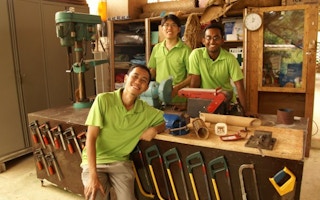A new outfit in Singapore is looking to shake up the corporate social responsibility (CSR) space by launching a programme that helps to match-make corporations to meaningful projects as part of their CSR efforts.
London-based law firm Olswang Asia, which has an office in Singapore, on Wednesday launched the Social Enterprise Partner Programme with the Social Enterprise Association (SEA) of Singapore.
The initiative hopes to help both international and local companies in creating meaningful CSR relationships with the various organisations under the SEA, a three-year-old organisation with more than 500 members, including individuals and organisations.
It hopes to bridge the gap between corporations looking for CSR projects and social enterprises looking for support.
Olswang Asia wants CSR activities to be a lasting connection between parties - rather than just a one-off involvement.
Elle Todd, a partner at Olswang Asia who has received a Camden Environmental Excellence Award in 2011 for steering the firm’s environmental performance, tells Eco-Business: “I found when we moved to Singapore we wanted to expand our CSR programme in the country.” The firm, which opened a Singapore office to service clients in Asia, had always been involved in CSR efforts in Europe. However, Todd discovered that Singapore is in a “unique situation.”
“It’s a challenge to find organisations to help, to do something with the local community.” There was a question of “how to make a difference,” a perennial question asked by many firms. Some, she noted, simply opted to conduct their CSR projects in nearby countries.
Then she chanced upon SEA. “I brought a piece of clothing to a shop around the corner from my office for an alteration and I found out they were part of SEA, helping mothers develop skills.”
From this personal encounter, she set out to initiate more outreach opportunities—this time between the umbrella organisation’s affiliates and members of the business community.
By collaborating with SEA, Olswang Asia will match interested companies to an organisation they can work with for a duration of one year.
Todd says that oftentimes, “corporations think quite literally and just give money or send volunteers.” The Social Enterprise Partner Programme will enable them “to become more engaged and build a relationship, which involves different things likes sharing supplies, connections and mentoring.”
Part of the programme also will be educating businesses on what social enterprises are, since, as Todd points out, “these are not charities.”
One of the social enterprises connected with SEA, and which aspires to be a participating organisation in the programme, is Sustainable Living Lab (SL2). The social start-up founded in June 2011 by Mohd Ibnur Rashad, Veerapan Swaminathan and Tan Huei Ming, all 20-somethings with an engineering background, helps communities and impoverished and disenfranchised individuals through creativity and skills training.
The team at SL2 want to “grow the lab into a bigger prototyping space” and hopes that the Social Enterprise Partner Programme will help them achieve this, says Rashad.
They are one of several organisations that will be matched to companies who sign up to the initiative. While it is still to early to tell, Olswang Asia hopes the number of participating firms will be more than enough to partner with the SEA’s list of social enterprises. However, Todd emphasises that the target does not hinge on quantity. “We’re looking at quality relationships,” she says.
The programme may still be gathering participants now but for her, as long as these are those who seek true local involvement and give generous support, then the programme has accomplished its task.










